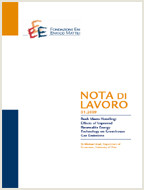Ellsberg Re-revisited: An Experiment Disentangling Model Uncertainty and Risk Aversion

07.04.2016
D81
Ambiguity Aversion, Model Uncertainty, Reduction of Compound Lotteries, Non-expected Utility, Subjective Probabilities, Decreasing Absolute Ambiguity Aversion
Mitigation, Innovation and Transformation Pathways
Massimo Tavoni
The results of an experiment extending Ellsberg’s setup demonstrate that attitudes towards ambiguity and compound uncertainty are closely related. However, this association is much stronger when the second layer of uncertainty is subjective than when it is objective. Provided that the compound probabilities are simple enough, we find that most subjects, consisting of both students and policy makers, (1) reduce compound objective probabilities, (2) do not reduce compound subjective probabilities, and (3) are ambiguity non-neutral. By decomposing ambiguity into risk and model uncertainty, and jointly eliciting the attitudes individuals manifest towards these two types of uncertainty, we characterize individuals’ degree of ambiguity aversion. Our data provides evidence of decreasing absolute ambiguity aversion and constant relative ambiguity aversion.
***
Suggested citation: Berger, L., V. Bosetti, (2016), ‘Ellsberg Re-revisited: An Experiment Disentangling Model Uncertainty and Risk Aversion’, Nota di Lavoro 37.2016, Milan, Italy: Fondazione Eni Enrico Mattei
